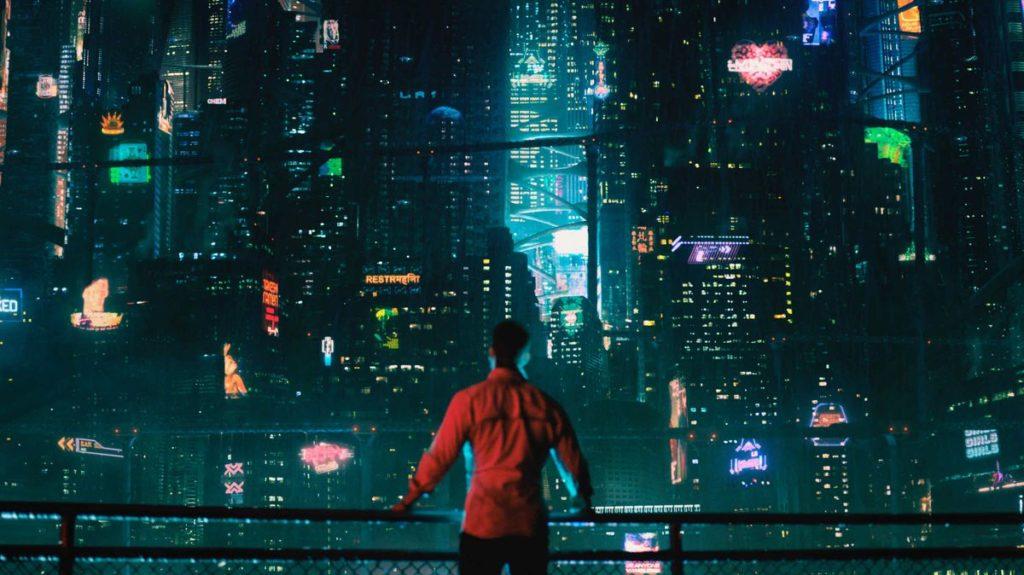This review contains spoilers for “Altered Carbon.”
If “Blade Runner” posed the question “What does it mean to be human?” then Netflix’s latest series, “Altered Carbon,” asks, “What does it mean to live?” Or, at least it tries to.
In the distant future, humanity has beaten death — sort of. Human consciousness is stored in a cortical stack, a biomechanical disk implanted at the base of the neck. These stacks enable humans to transfer their consciousness into any body, provided they have the money. The result is a dystopian cyberpunk intergalactic system that grants the rich immortality. The immortals are called “meths” after Methuselah, a biblical figure said to have lived 969 years.
Takeshi Kovacs (Joel Kinnaman) is a disgraced member of a military sect and was put in stasis for 250 years after joining a pro-death revolutionary group. He’s reawakened in Bay City to solve the murder of Laurens Bancroft (James Purefoy), a powerful meth. Along the way, he encounters a sentient hotel, biomodded mutants, a religious zealot, a flying sex fortress, clones, androids, alien trees, gang leaders, virtual torture, fight clubs and a convoluted conspiracy.
Overwhelmed yet?
That’s the fundamental flaw with “Altered Carbon” — it tries to cram too much plot into too few episodes. The first half of the show has a singular vision; it centers on Laurens’ death and Takeshi’s mission to find the killer. But as the show progresses, it loses this focus and starts exploring pointless, plodding tangents. By the final episode, the characters are so far from where they started that Takeshi and friends feel like they’ve stepped into another show that’s more like a soap opera than a cyberdrama.
The conclusion is built around Takeshi’s relationship with his sister, Reileen (Dichen Lachman), their rocky past and her attempts to win his love by murdering everyone he cares about. Not only is her motivation downright cartoonish, but her actions are inconsistent and often work against her end goal to secure a stable life for herself and her brother. She tries to save Takeshi as often as she tries to kill him.
But Takeshi himself isn’t worth caring about. His character is styled after a noir detective, but he does less sleuthing than whining. It takes 10 episodes for Takeshi to understand the simple idea that some people actually like him and can help him on his journey. In seemingly every episode, he casts his friends aside, tries to isolate himself and then runs, desperate, to their aid when his negligence puts them in danger. It’s an exhausting cycle that repeats and repeats and eventually becomes dull.
Equally frustrating is the contrived romance between Takeshi and police Officer Kristin Ortega (Martha Higareda). The show builds their relationship and establishes the trust between them, only to undermine it entirely in the final episode. It feels cheap, manipulative and disrespectful of the viewer’s time. The problem isn’t that they don’t end up together — spoilers, they don’t — but that the reason for their split serves only to fuel a second season.
Even the visuals feel hectic and overdone. The streets look like rough approximations of “Blade Runner.” A neon glow casts the crowds of prostitutes and degenerates in shadow. Holographic women advertise sex shops, while musclebound monstrosities promote fight rings. For a television series, it certainly has a cinematic scope, but, like the story, the aesthetic lacks consistency. The show bounds from grimy streets to glittering castles above the clouds without pausing to acknowledge the change in tone.
The only unquestionable joy in “Altered Carbon” is Poe (Chris Conner), an AI in charge of a long-abandoned hotel. Poe is charismatic, sympathetic and ultimately more human than the rest of the cast.
“Altered Carbon” suffers from tonal whiplash. It jolts viewers back and forth between a military drama, a sci-fi philosophy piece, a revolutionary adventure and a family drama. It’s difficult for a viewer to invest in any one facet of the story because the moment their interest is piqued, the show gets sidetracked.
There’s enough material for a second season, but “Altered Carbon” is better off dead.




















